Vaccinations required for
china. China is no mean country. Indeed, with many contributions to
world's civilisation over the years,
technological breakthroughs, rich and striking cultures, and a buoyant
economy, for example, people of all shades and walks of life from the world over visit it. It is no surprise then that many people run searches on required
vaccines needed as regards travelling to China. This forms the aim of this writing. In this way, we'll touch upon vaccines
travellers to China need and whether or not vaccination is mandatory to get into China. That is, whether China makes vaccination compulsory for visitors.
 |
| Credit: BBC.com |
It has been said that
health is
wealth, but more than that we hold that health is life, the pedestal of near-unalloyed happiness, and money-saver. Normally if you're healthy, you can be truly happy. This is different from the laughter or fleeting happiness sick or some people who have one health challenge or the other have. And, the money for preventing the contracting of sicknesses or diseases is always lower than that used in curative measures. So, if you were travelling to China, it is a brilliant move indeed to search for the vaccinations required. First of all, China does not mandate travellers to China to take any vaccine before visiting. That is, on travellers' arrival at China, your papers are not checked to see if you have met some vaccination requirement, law or policy. Put differently, you don't need some required vaccinations to obtain a
Chinese visa, although
yellow fever vaccine is mandatory for people visiting China from countries with the risk of yellow fever. Countries with the risk of yellow fever and "China vaccine schedule" shall be addressed much later in this article. For now, let's quickly see the vaccines you'd need while
visiting China.
What vaccinations do I need for China?
While vaccination is not mandatory to visit China, it is of extreme importance to foreign visitors as they are prone to contract various diseases, for varying factors. Certain factors determine the vaccine you should take before setting out to China. Some are where you're travelling from, where you'll be visiting in China, your current
health status, the time or season you're travelling, and the duration of your stay in China, that is, how much time you'll be spending there.
It is natural that vaccines countries will recommend for their citizens may vary, so where you're travelling from as well as where you'll be visiting in China, say, rural areas, the kind of work you'll be doing, and your activities there contribute to the factors that determine the vaccine you'll take. The
CDC,
the Centers for Disease Control and Prevention, recommends that travellers should, first of all, be up to date on routine vaccinations while travelling to any
destination. Some vaccines may also be required for travellers and these will be discussed a little later.
The routine vaccines include measles-mumps-rubella (MMR) vaccine, diphtheriatetanus-pertussis vaccine, varicella (chickenpox) vaccine, polio vaccine, and your yearly influenza (flu) shot.
Also kindly read: Do I need a visa for China
Routine, or compulsory vaccinations while travelling to China
MMR: The MMR vaccine are compulsory. When a child is growing up, only one is recommended. So, speculatively, many adults have not taken the second shot - every human should take two shots. If you haven't, you should. This is important for tourists, business people, students or whoever will meet people on a daily basis and especially if you're staying in China for a long time. China is a very populated country and besides it is one country many people visit. For example, it has been reported that over 70,000 people visit the busiest section of the Great Wall of China, Badaling, in a day in peak periods for the purpose of a tour, only. What this means is that the possibility of contracting measles is high and so to get a second MMR vaccine is required for you.
DPT: You should take tetanus or diphtheriatetanus-pertussis vaccine if it's now more than ten years since you last took it. And, if you're pregnant or are always with children or will be, you should discuss DPT with your general practitioner or a specialist in the field.
Pneumonia: Smokers, those who are asthmatic, those in some chronic condition, or those over 65 should talk to their general practitioner or a specialist in the field about getting the pneumonia vaccine.
Varicella or Chickenpox: Travellers to China are also faced with the risk of contracting chickenpox. This can be prevented squarely.
TravelReadyMD says two dose will ensure adequate protection, although we always recommend the advice of an expert, because exactly what you'd need will be different from another individual.
Influenza or flu: You should ensure to take this vaccine before travelling to any destination. CDC says it is taken yearly; so, say, if you were in China for more than one year, you should ensure to retake it, and renew it yearly.
Specific vaccinations for travellers to China
The foregoing are compulsory but those are not all the vaccine needed while travelling to China. There are more vaccines travellers should consider. And while they are not compulsory, they are very important because travellers to China may be exposed to certain diseases depending on where they'll be visiting or living there, what they'll be doing etcetera. These vaccines include Hepatitis A, Hepatitis B, Typhoid, Polio, Japanese Encephalitis, and Rabies.
Hepatitis A:
CDC as well as other medical authorities recommend this vaccine for travellers to China because they can get hepatitis A as it is rather widespread in China. The vaccine is recommended for anyone older than twelve months. Two doses 6 months apart for full protection are required, although one dose often works well. But if you would be taking Hepatitis B too, there is an accelerated schedule of Twinrix (Combination Hepatitis A+B vaccine) which can provide protection in as little as twenty one days. Some diseases are more prevalent in some regions than others, but regardless of where you will be visiting in China, you should take this vaccine as Hepatitis A spreads through poorly washed hands, or food (say, fruits), and contaminated food or water. Besides this vaccine, in this connection, you should always wash your hands, say whenever you return from your outing, thoroughly with clean water and soap, or use some good hand sanitizer; wash fruits thoroughly before eating them and don't ever eat the bad ones; only drink bottled water, or a good alternative, but never any water; do the same when brushing your teeth; never go to eat in some substandard restaurant to ensure you don't eat contaminated food thereby avoiding the risk of contracting Hepatitis A.
Typhoid: This vaccine is strongly recommended by the CDC, as typhoid can be contracted through contaminated food or water in China. It is strongly recommended for travellers, especially if they will be staying with people - friends or relatives, visiting smaller cities or rural areas, or if they were an adventurous eater.
Hepatitis B: China is well populated country and many contemporary activities are there. Hence, the risk of contracting hepatitis B is rather high, although this vaccine is not recommended for travellers to China. How is Hepatitis B contracted? Basically, it spreads or is contracted through body fluids. In this way, it can be contracted through sexual intercourse, kissing, contaminated needles, finger cutters, razor blades, or clippers, say, while cutting your hair or getting a tattoo, piercing, or any medical procedures like stitching, for example, and through blood products. What will your activities in China be like, or what kind of traveller are you? If you will be doing or using some of the things already listed, then you should consider this vaccine. If you will not, we still recommend it, especially if you will be staying in China for a long time, and also because the disease can lapse into some severe illness or liver cancer in some persons. It takes 3 doses over 6 months for full protection, however an accelerated schedule of Twinrix can be given over twenty one days
Japanese Encephalitis: Transmitted by mosquitoes, this viral disease is prevalent in the rural areas of China. This vaccine is needed depending on where you be visiting in China, how much you will spend there (are you spending more than a month in China?), and the season during which you will be going to China. You should consider this vaccine for this three factors, especially where you'll be visiting -- the rural areas -- or anywhere mosquitoes are found, as well as if you'll be spending a lot of time outdoors, even for trips shorter than a month. Seek the advice of a doctor to determine if this vaccine is appropriate for you depending on your itinerary. If your itinerary does not include rural areas, and your doctor has not prescribed this vaccine for you because of that, then you must be strict with your itinerary, and especially not defy it visiting rural areas.
Polio: If you will be visiting the Xinjiang province in China, then this vaccine is highly recommended to you, especially if you will be working in a health care facility, refugee camp, or humanitarian aid setting, as you might make contact with someone infected with polio. Polio is contracted by making contacts with infected persons. If you were vaccinated against it as a child but have never had a polio booster dose as an adult, you should get this booster dose. Adults need only one polio booster in their lives. If you were not completely vaccinated as a child or do not know your vaccination status, talk to your doctor about this.
Rabies: Immunization against Rabies is recommended to both adults and children. Rabies can be contracted through animal bites. Such animals include bats, monkeys, cats, dogs or whatever mammal you can think of in China. The length of your stay in the country and/or the activities you'll engage in in China will determine whether or not you should take this vaccine. If you will stay in China for long or are moving there; if you will engage in activities such as camping, hiking, biking, adventure travel, caving, working with or around animals (such as veterinarians, wildlife professionals, and researchers) you should take this vaccine as you are more likely to get an animal bite which may result in Rabies.
Malaria: Anyone can contract
malaria in China; you should therefore avoid mosquito bites. One of such ways to do this is to sleep in medicated mosquito net always. There are medications which prevent your contracting malaria. Unlike most vaccines, you shouldn't take anti-malaria medication only before travelling; you should also take anti-malaria medication during your stay in China according to the prescription of your doctor, as well as after you return from China. Visitors in China can easily contract malaria if they spend time outdoors, in rural areas, close to dirty waters like rivers, in woods, or sleep outside.
Countries considered having the risk of yellow fever
While China does not make vaccination mandatory for visitors, they do on yellow fever vaccination for people coming from countries marked with the risk of yellow fever. Below is data according to WHO about countries with the risk of yellow fever. WHO has stated that 44 countries in the world have the risk of yellow fever. Of these countries, 33 are African, while 11 are in Central and South America.
They are:
For African countries: Benin, Chad, Congo, The Public of Guinea, Equatorial Guinea, Ethiopia, Ghana, The Republic of Ivory Coast, Nigeria, Sierra Leone, Sudan, Uganda, Zaire, Cape Verde, Burundi, The State of Eritrea, Gambia, Guinea-Bissau, Rwanda, Sao Tome and Principe, Somalia, Tanzania, Cameroon, Kenya, Liberia, Mali, Angola, Burkina Faso, Gabon, Mauritania, Senegal, Togo, Central African Republic.
For countries in Central and South America: Brazil, Bolivia, British Guiana, Columbia, The Republic of Ecuador, French Guiana, Panama, Peru, Surinam, Paraguay, Venezuela
China vaccine schedule
For those wondering what China vaccine schedule would be, it's what we've been discussing. There is no fixed vaccination schedule for everyone travelling to China. Where you're visiting in China, the activities you'll be engaging in, such as recreational activities or your work, your kind of person (are you extrovert and loves to meet people?), the food you'll eat and how long you'll stay in China will determine your vaccination schedule. This is why it necessary to read the vaccines above.
Conclusion
These vaccinations are reliable, however every individual has a unique constitution, faculties and health status. Thus, while these vaccinations are specific, the individuality of people renders them general. Hence, we recommend you seek your
general practitioner or a
specialist in the field for recommendations consequent upon your individual status, your itinerary and activities in China to you. Taking vaccines is a bid to prevent diseases, but you should also prevent them by always washing your hands with soap and clean water or use some good hand sanitizer, don't eat contaminated food (fruits included) or water (drink good water. Say, bottled water), avoid animal bites and those of
mosquitoes (so use a medicated
mosquito net especially when sleeping, mind living in rural areas or spending time in them and close to dirty waters), use only sterilized clippers or any metal hair cutter, finger cutters, needles and the like.





